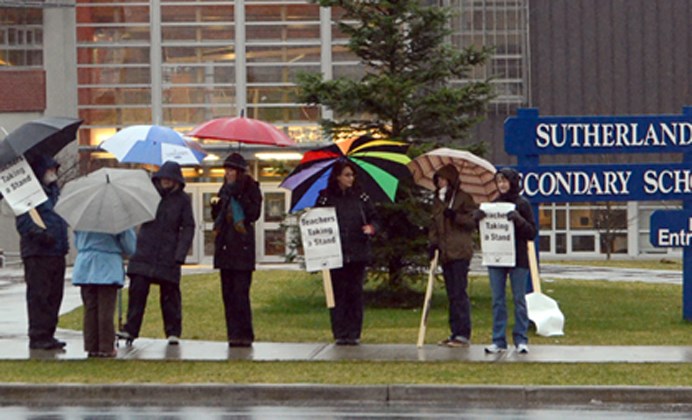North Shore teachers were applauding a B.C. Supreme Court decision this week that struck down a decade-old provincial law that took away teachers' rights to bargain class size and classroom supports for special needs students.
Presidents of both the North Vancouver and West Vancouver teachers associations, who represent about 1,500 teachers in the two school districts, said they were pleased with the ruling, which fined the province $2 million, but added it was bittersweet after a decade of court fights on the issue.
"It's been a long battle," said Rob Millard, president of the West Vancouver Teachers Association.
Since the province stripped the teachers of the ability to set limits on class size, those numbers have been rising, as has the number of special needs students in each class.
The impact has been "significant," said Daniel Storms, president of the North Vancouver Teachers Association. "You didn't notice it right away but it's been cumulative."
Storms said over the past decade, teachers have been dealing with more students who have complex needs in the classroom at a time when "resources are getting fewer and fewer."
According to Ministry of Education statistics, there are 629 classes in North Vancouver schools with four or more special needs students. Six years ago, that number was 209. A total of 662 classes have assigned education assistants compared to 439 six years ago.
In West Vancouver, 191 classes have four or more special needs students, compared to 101 classes six years ago. A total of 236 classes have assigned education assistants compared with 265 classes six years ago.
The court decision this week essentially restores the teachers' contract provisions to what they were in 2002 when there were stricter limits on both class size and the number of students with special needs that could be placed in each class.
How to achieve that in practice will not be simple, said Storms, adding the cost has been estimated provincewide at between $200 million and $300 million.
In a district the size of North Vancouver, the cost could run up to between $8 million and $10 million, he said.
Both the province and the BC School Trustees Association have been studying the lengthy legal decision. Earlier in the week, Premier Christy Clark said the province might consider an appeal.
In a summary of her ruling, B.C. Supreme Court Justice Susan Griffin concluded that "the government did not negotiate in good faith with the union" after its legislation limiting teachers' bargaining powers was struck down the first time. She said the reason was government negotiators were occupied with a strategy of putting pressure on the union to provoke a strike. "The government representatives thought this would give government the opportunity to gain political support for imposing legislation on the union," wrote the judge.
North Vancouver political commentator and former NDP MLA David Schreck said that was particularly shocking.
He said the financial consequences of the court ruling are huge, but added, "the government has no one to blame but themselves."
"A government cannot simply ignore the constitution and do whatever it wants to."



